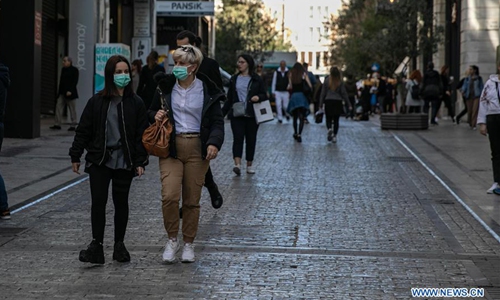HOME >> OPINION
Ideological narcissism causes heavy losses to West amid outbreak
By Tom Fowdy Source:Global Times Published: 2020/3/14 16:03:40

People wearing masks are seen in downtown Athens, Greece, on March 13, 2020. Greek authorities on Friday further expanded closure measures to control the novel coronavirus epidemic by ordering the shutdown of museums, archaeological sites, restaurants, coffee shops, bars, shopping malls and libraries nationwide, as confirmed novel coronavirus cases climbed to 190 from 117 a day earlier. (Photo by Lefteris Partsalis/Xinhua)
When COVID-19 emerged in China, Western media did not think twice about using the epidemic to launch a full-scale assault on the country's political system and governance. Throughout January and February, commentary framed events in Hubei Province as an exclusive failure of China and its leadership, preaching the virtues of liberal political systems which they implicitly assumed would not suffer from such a catastrophe.BBC China correspondent Stephen McDonell, a staunch critic of China, said the death of Dr. Li Wenliang constituted "an epic political disaster," and laid bare "the worst aspects of China's command and control system of governance," while the American establishment-linked "big three" newspapers took liberties in attacking the country, branding it the "sick man of Asia" with themselves and numerous others pushing to affirm the superiority of the West over China and relishing in negative coverage.
A month later, things look different. Newly reported cases in China have dropped to low levels, even in Hubei. Although there is no question the country has paid a heavy toll in terms of fatalities and economic frustrations, it is clear China has overcome the worst of it and has successfully stifled the spread of COVID-19.
Undoubtedly, the country has shown remarkable resilience and action. On the other hand, as the situation in China has improved, a number of Western countries are now experiencing growing COVID-19 outbreaks in Italy, France, Germany, Spain, and the US.
The outbreak is a global pandemic and not a game of winners and losers. However, in the early stages, Western media and political classes certainly framed it that way. Their assertion of supremacy and obsession with attacking China effectively caught them off guard and created complacency, having conceptualized it squarely in terms of being a political disaster. Thus, as the virus has spread throughout the world, the same individuals are waking up to the reality that this was not exclusively rooted in ideology, and that China's response was far from incompetent.
What is the West? Evolving from a generic geographic term pertaining to Europe, it alludes to a group of countries who claim a mantle of political and social supremacy over the binary "other" of the non-West, or more specifically "East."
Evolving from Christianity into liberal thought, these countries herald an ideological disposition that they are the sole bearers of a one, single and universal ontological political truth of which they have a righteous mission to disseminate to others. Like the teachings of their preceding faith, they believe strongly that their way is "the only way" and no alternative disposition has any authenticity or legitimacy, for liberalism is "the truth" and all whom do not align with it are simply heathens who are subject to some form of deception or ignorance.
These ideological foundations strongly shape Western coverage and attitudes toward China, advocating a mind-set that the system is completely illegitimate and worthy of no merit, and thus it is the Western responsibility to "change" China to the "right way" accordingly. Therefore, such journalism has a built-in ideological bias which is pre-disposed toward negativity, cynicism and the belief it is doomed to collapse.
These problems have heavily influenced coverage of the COVID-19 which sought to exclusively portray it as a political failure and thus a "crisis" for the leadership what Western nations, owing to their ideology, could not possibly be subject to.
China's contingency efforts were therefore also portrayed as a failure, for example the New York Times branded the Hubei quarantine as a "great cost to people's personal liberties" - illustrating how obsession over a given political system and the overriding effort to affirm liberal narratives clouded an empirical and fair judgment of the situation. Similarly, US politicians championed the outbreak as an opportunity, and scores of political op-eds at major outlets appeared to say the disease proved business in China was unreliable, therefore it was time to "decouple."
Yet these judgments were misplaced and the vested belief in supremacy failed to give policymakers a clear conception as to what was coming next, because they were too busy believing it wasn't really their problem. Thus as China has overcome the virus, a number of Western democracies have subsequently begun to experience outbreaks and have found their own political systems offering no extra immunity and their markets in a state of chaos. The US for one has failed to even organize a sufficient number of testing kits on time. Few predicted or even imagined a scenario whereby Beijing would be effectively declaring victory, while the West descended slowly into a state of panic.
Thus as a whole, it is important to acknowledge how ideology and political bias clouds Western judgment and perception when it comes to China. The belief of self-supremacy has lingered in Western thought since the Middle Ages and thus the idea of a foreign, non-Western system battling a disease outbreak effectively touched upon these imaginations in the belief that these things "simply could not happen to us" due to our "superior way of life" but sadly, it has. Diseases do not respect nationalities or political systems, and it is now thus time for humanity as a whole to work together and stop scoring points over this horrific pandemic.
The author is a British political and international relations analyst and a graduate of Durham and Oxford universities. opinion@globaltimes.com.cn
Posted in: VIEWPOINT